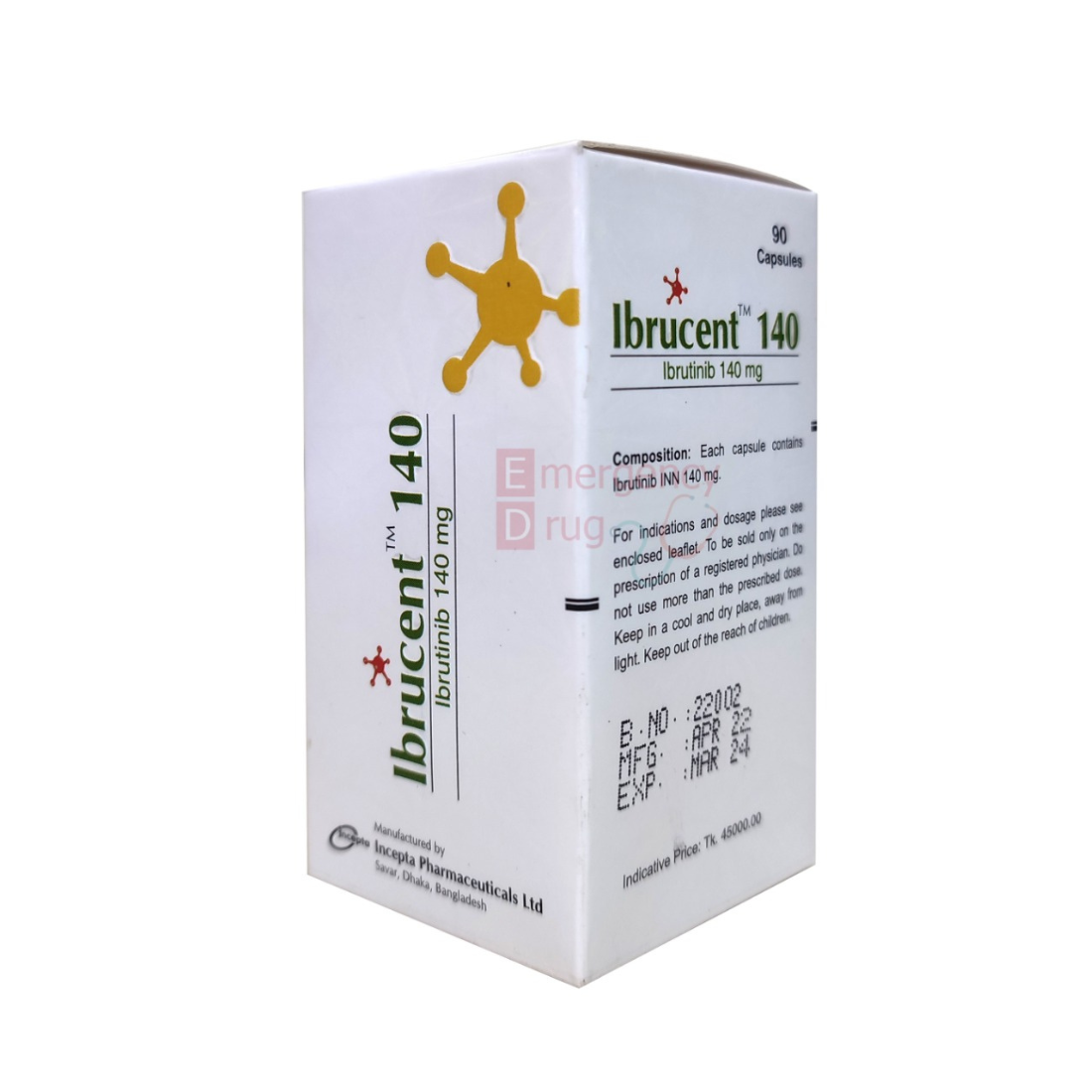Description
Ibrucent 140 mg (Ibrutinib) is a small-molecule inhibitor of BTK. It forms a covalent bond with a cysteine residue in the BTK active site, inhibiting BTK enzymatic activity. BTK is a B-cell antigen receptor (BCR) signaling molecule and cytokine receptor pathways. BTK’s role in signaling through the B-cell surface receptors activates pathways necessary for B-cell trafficking, chemotaxis, and adhesion. Nonclinical studies show that Ibrucent inhibits malignant B-cell proliferation and survival in vivo, as well as cell migration and substrate adhesion in vitro.
Product Features:
| Product Name | : Ibrucent |
| Generic Name | : Ibrutinib |
| Manufacturer | : Incepta Pharma Ltd |
| Indication | : Mantle cell lymphoma |
| Formulation | : Capsule |
| Strength | : 140 mg |
| Quantity | : 90 Capsules |
| Storage | : Below 30° |
| Registrations | : Export Only |
Indications Ibrucent
Ibrutinib is a kinase inhibitor indicate for the treatment of patients with:
Mantle cell lymphoma (MCL) who have received at least one prior therapy. Accelerated approval was granted for this indication based on the overall response rate. Continued approval for this indication may be contingent upon confirming clinical benefit in confirmatory trials. Chronic lymphocytic leukemia who received at least one prior therapy. CLL has 17p deletion and Waldenström’s macroglobulinemia (WM).
Dosage & Administration: Ibrutinib needs to be taken orally with a glass of water. The capsules do not open, break, or chew.
Side Effects of Ibrucent
The most common adverse reactions (≥25%) in patients with B-cell malignancies (MCL, CLL, WM) were thrombocytopenia, neutropenia, diarrhea, anemia, fatigue, musculoskeletal pain, bruising, nausea, upper respiratory tract infection, and rash.
Precautions Ibrutinib
Hemorrhage: Taking care of the bleeding. Infections Patients must monitor for fever and infections and be evaluated. Cytopenias complete blood counts checked monthly. Atrial Fibrillation patients take care of atrial fibrillation. Second Primary Malignancies have occurred in patients, including skin cancers and other carcinomas. Patients are at risk for Tumor Lysis Syndrome(TLS). Embryo-Fetal Toxicity Can cause fetal harm. Women are often conscious of the potential risk to a fetus for pregnancy while taking the drug.
Pregnancy and Lactation
- Using ibrutinib during pregnancy only in LIFE-THREATENING emergencies when no safer drug is available.
- There is positive evidence of human fetal risk.
- Based on animal findings, ibrutinib can cause fetal harm when administered to a pregnant woman.
- While ibrutinib is used during pregnancy or if the patient becomes pregnant while taking ibrutinib, the patient appraises for the potential hazard to the fetus.
- Before taking medicine, women to avoid becoming pregnant while taking ibrutinib and for 1 month after discontinuing treatment.
- In pregnant rats during the period of organogenesis, 80 mg/kg/day was associated with visceral malformations (heart and major vessels) and increased post-implantation loss; 80 mg/kg/day in animals is about 14 times the exposure (AUC) in patients with MCL administer the dose of 560 mg daily.
- It is unknown if ibrutinib distribute in human breast milk; consult your physician if breastfeeding.
For more Oncology medicine, visit our SHOP













Annie Newman –
Ordered Ibrucent 140 mg in good time, promptly shipped, and arrived with an extended expiry date. Reasonable pricing and super customer service.